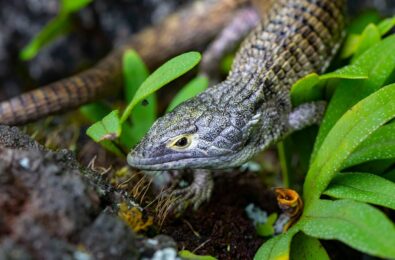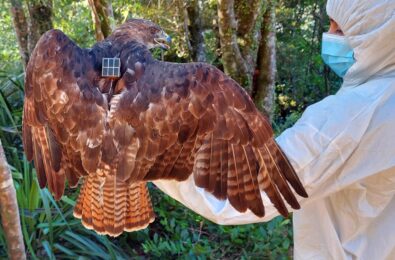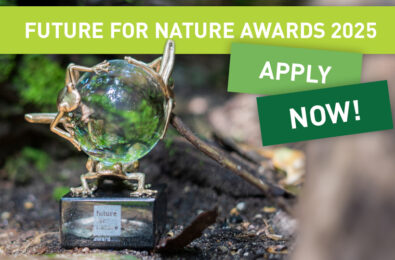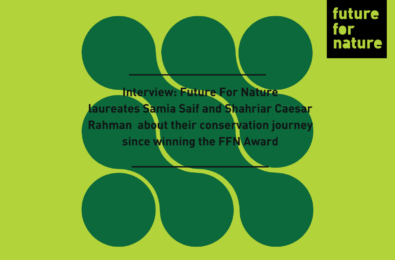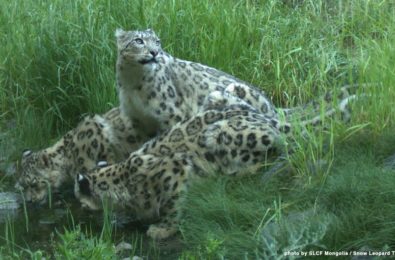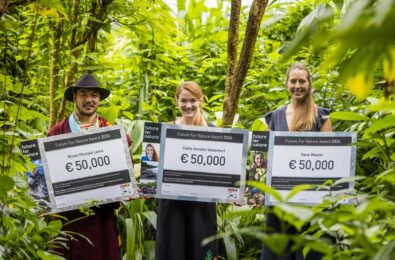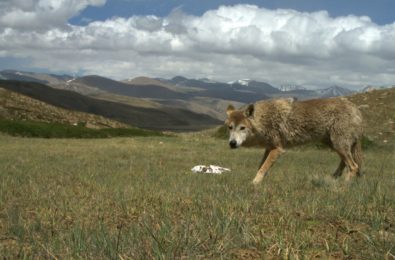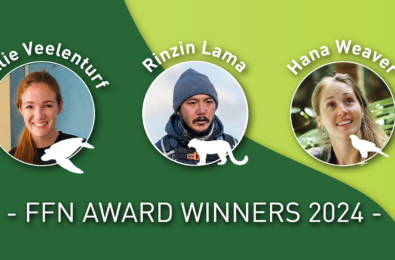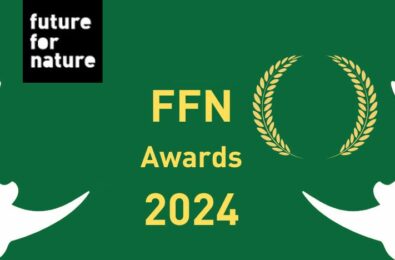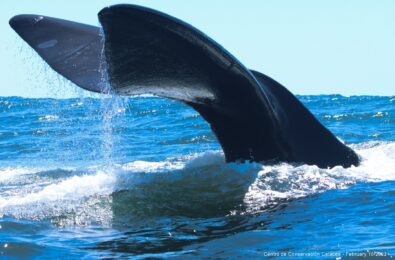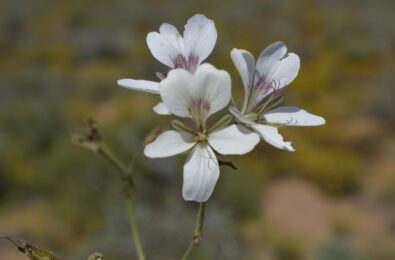Every Pangolin Counts for Madelon Rusman
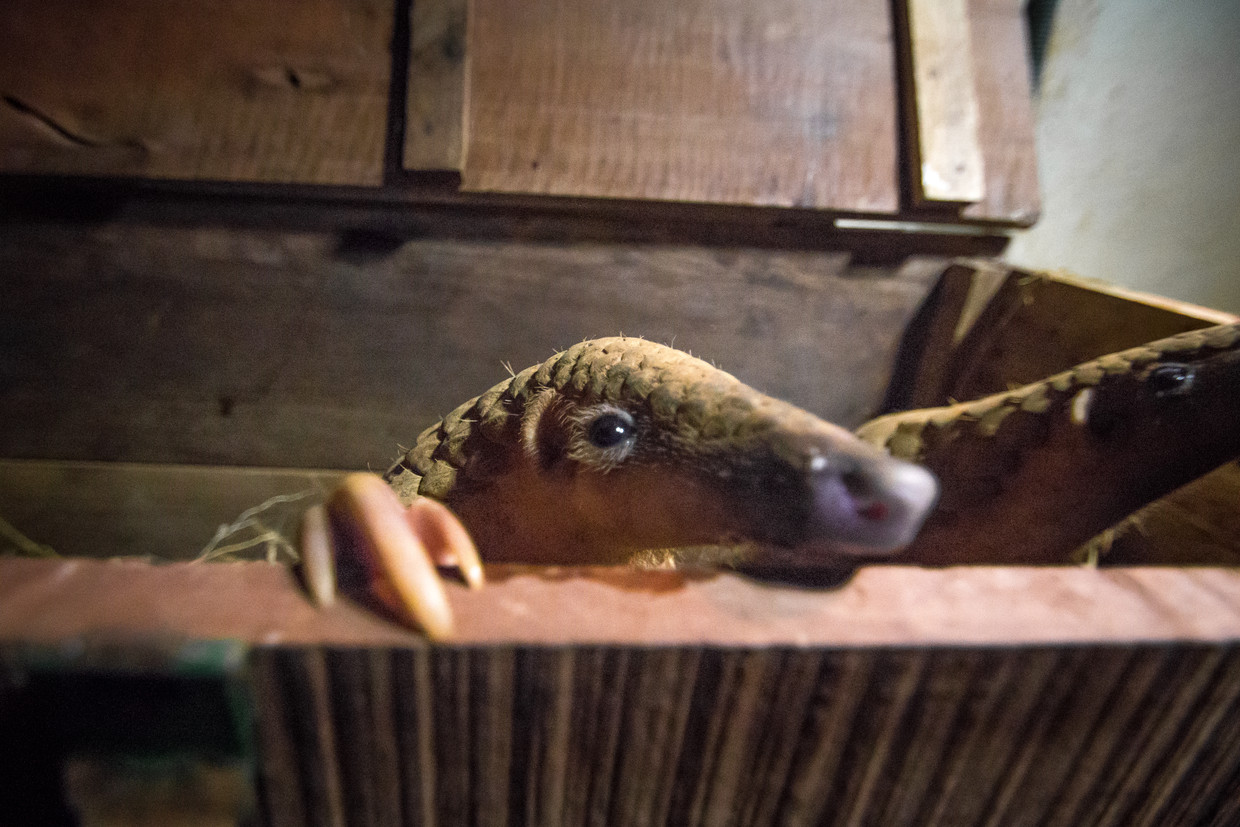
Translation of the Trouw newspaper, original article written by Alexis de Roode and Anne Broeksma, published on the 26th of January 2018. About the work of Save Vietnam’s Wildlife, founded by Thai Van Nguyen (Award winner 2016). The article was written when Madelon Rusman was working at the organisation.
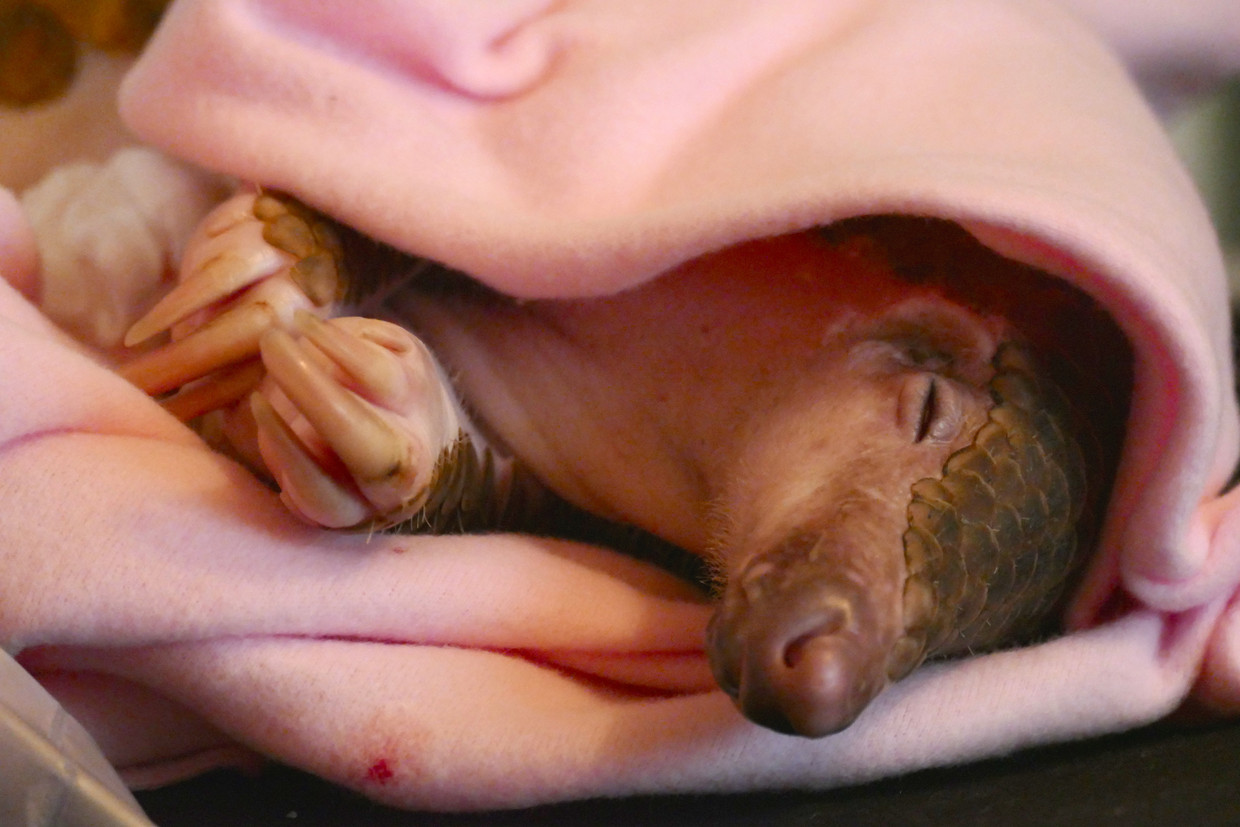
One pangolin peeks around a corner and another one is sleeping in the shelter in Vietnam. Image Alexis de Roode
Pangolins are the world’s most poached animal. All eight species are now threatened with extinction. Madelon Rusman is trying to turn the tide in Vietnam.
Civets smell like cinnamon, binturong like popcorn, but pangolins have a sharper scent, a mixture of forest soil and fish sauce. It is immediately noticeable when Madelon Rusman (32) opens the door to the pangolin shelters. Most of the cages are quiet, but behind the bars of door Q33, a loud sniff is heard. A slender nose comes out between bars and tries to catch our scent. Large brown scales become visible through the red light of a heat lamp. When the door opens, we see a kind of walking pinecone with a long tail. Q33 immediately tries to waddle out. Madelon Rusman looks worried: “He should be sleeping now,” she says. “When they are this active during the day, it is often a sign that something is going on.”
Madelon Rusman would know, as she has been working in Cuc Phuong National Park for almost a year now, as Animal Manager of an endangered species rescue centre for the organisation Save Vietnam’s Wildlife. Besides pangolins, she is also responsible for civets, leopard cats and binturongs. All these animals were intercepted from illegal wildlife trade.
When Rusman arrived at her new job, in April 2017, she had never seen a pangolin in real life. She got the job based on her work experience at the Jersey Zoo, where she worked on conservation programmes for endangered species. The night of her arrival, she saw her first pangolin, a pangopup weighing 400 grams. She was delighted. But the next day she experienced a reality check:
“I had worked for one day, was still jetlagged, and was looking forward to my bed. Then the phone rang in the evening. 118 pangolins were found during a police check. We had to head out with the whole team. “
Poaching Nets
“When we arrived at the police station we saw the pangolins lying on the ground, rolled up in nets. They had been piled up in a truck for days. The animals at the bottom were covered in diarrhoea of the animals on top. The poachers force-feed them corn porridge because they are paid per kilo. The pangolins were clawing in their nets trying to escape. At that moment you already have to make difficult choices: which animals do you save first, which animals have to wait. ”
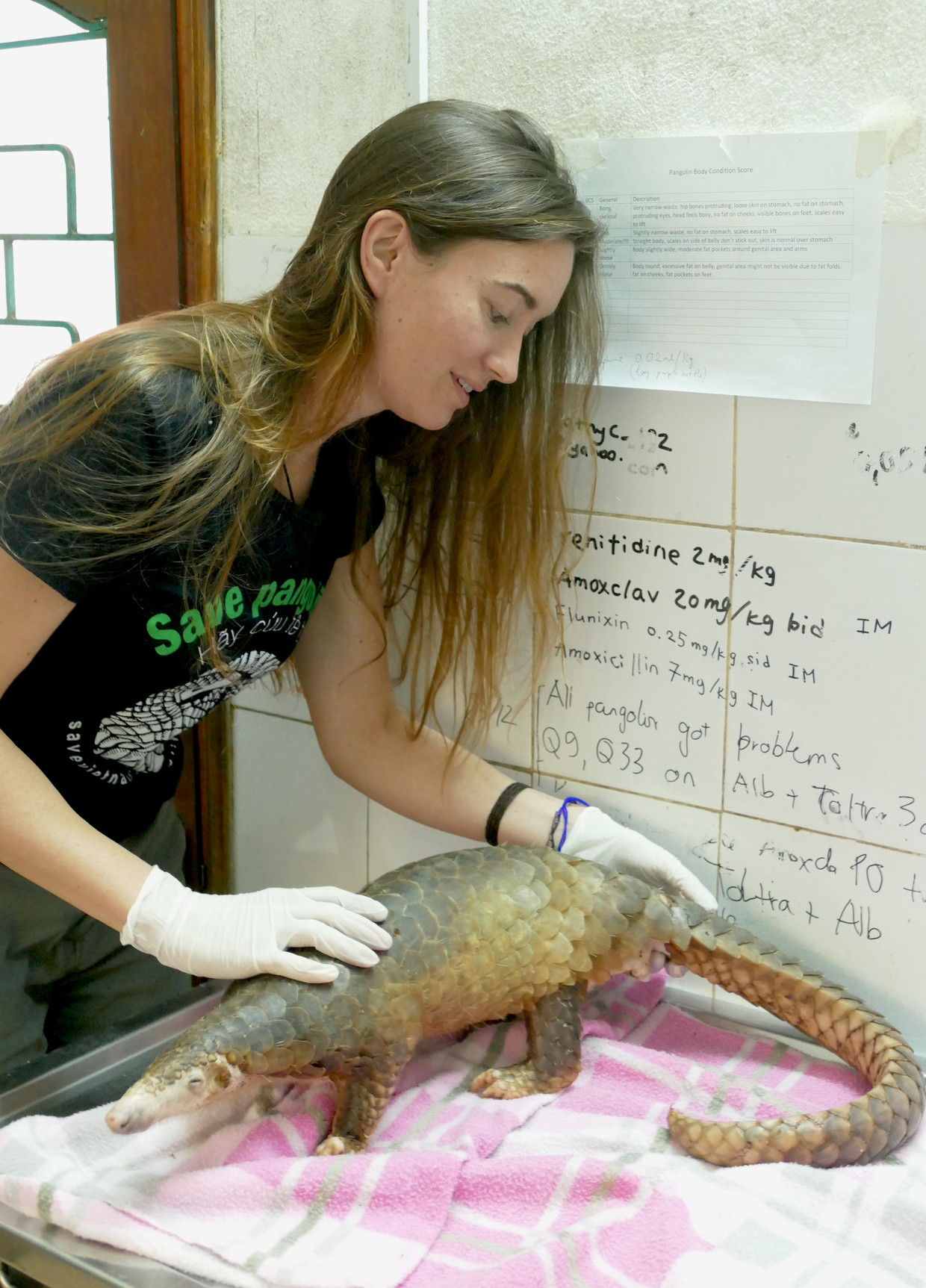
Madelon Rusman from Save Vietnam’s Wildlife investigates a pangolin. Image Alexis de Roode
Ultimately, Save Vietnam’s Wildlife was able to save about 70 percent of the rescued animals and later released them into the wild at secret locations. The reintroduction to the wild is very important because pangolins are the world’s most poached animal. According to research from the University of Sussex, up to 2.7 million individuals are killed each year. Partly because pangolins have a maximum reproduction rate of one young per year, all eight species (four in Africa, four in Asia) are threatened with extinction. The scales are transported to China in large amounts, where they are used for traditional medicine. The meat is an expensive delicacy in China, Vietnam, Cambodia and Thailand.
The fact that these animals are difficult to keep in captivity makes it even more difficult to save them. They have a very strict diet: primarily ant eggs. Additionally, as pangolins are nocturnal animals, they are very susceptible to stress, cold, and noise.
“There is hardly any experience on how to take care of large groups of pangolins.
I’m trying things out, for example, whether they like to sleep in a small wooden box, because pangolins naturally sleep curled up in hollow trees. Everything you discover can contribute to the wellbeing of pangolins around the world. ”
Meanwhile, the numbers of pangolins surrendered to Save Vietnam’s Wildlife are increasing every year; from 22 animals in 2014 to 407 in 2017.
“A few years ago, when animals were intercepted we were not informed. Police sold most of the animals back to the poachers, through loopholes in the law. Through Save Vietnam’s Wildlife lobby efforts, the law has been tightened, and pangolins are no longer allowed to be sold back to poachers. ”
Unfortunately, hardly any action is taken to stop hunters, to Rusman’s frustration. “Vietnam has a lot of nature, but that nature has been hunted clean. Even the national parks are ghost forests .”

Photo Save Vietnam’s Wildlife
Save Vietnam’s Wildlife founder Thai Van Nguyen started rescuing the first pangolins in 2006. By trial and error, Nguyen developed an instruction guide on keeping pangolins, which is now used as a standard in shelters across Africa and Asia. In 2016, Nguyen received the Future For Nature Award from Royal Burger’s Zoo, a prize of 50,000 euro, for his pioneering work. Meanwhile, Save Vietnam’s Wildlife activities have expanded into research, lobbying, and education.
Noise is heard near the green entrance gate of the wildlife centre. A long string of Vietnamese toddlers in brightly coloured jackets comes our way two by two.
“In the past year, we showed 2,000 children around our education centre. We fill a gap, as it is not customary here to teach children a love for nature. Most of them have never been in the forest, even if they live next door. They only see that their father comes home with birds to sell on the market. It takes a real culture change if we want to keep the pangolin in Vietnam. ”
Last year, Save Vietnam’s Wildlife released 203 pangolins into the wild, a record figure. But isn’t it a drop in the ocean?
Become Extinct
“For an animal that is so close to extinction, every specimen counts. We barely have a picture of how large the wild populations in Vietnam is. Studies have yielded little information. The one animal that we rescue could be one of thousands, but also one of dozens. ”
To work on a future with pangolins in Vietnam, Save Vietnam’s Wildlife is now expanding its activities to Pu Mat, a large nature reserve on the border with Laos. Wild animals still live here, such as the extremely rare saola (‘the unicorn of Vietnam’) and the Annamite striped rabbit.
“We are going to train rangers there who will be empowered to arrest poachers. The ability to enforce strict rules is unique to Vietnam.”
Rusman draws hope from the fact that, as of January 1, 2018, Vietnam has drastically increased prison sentences for pangolin trade.
“The man who was caught with 118 animals in his truck was sentenced to only 9 months in prison, that made me so sad. Now he would be sentenced to ten years in prison. Vietnam knows darn well that the world is watching.”






